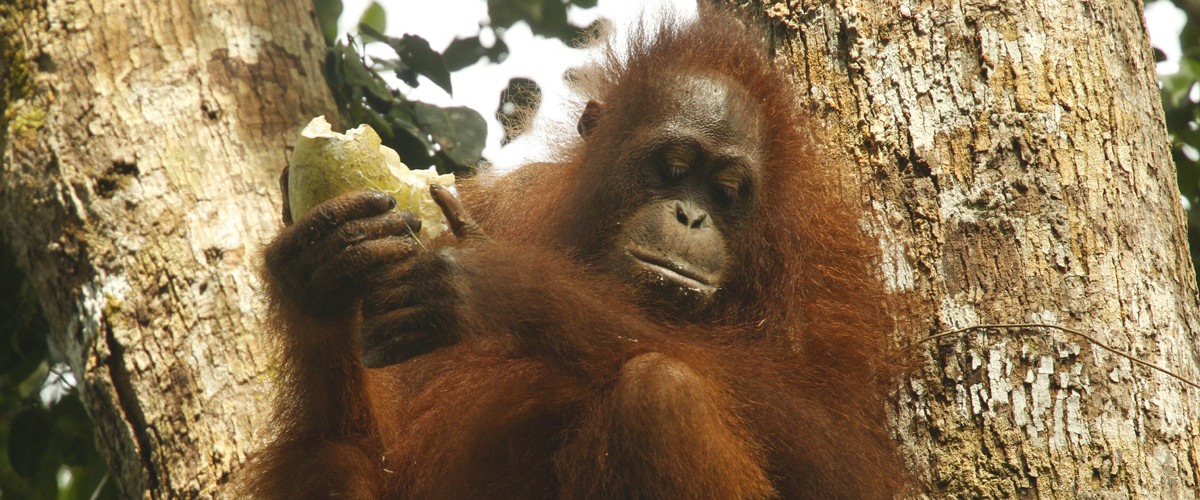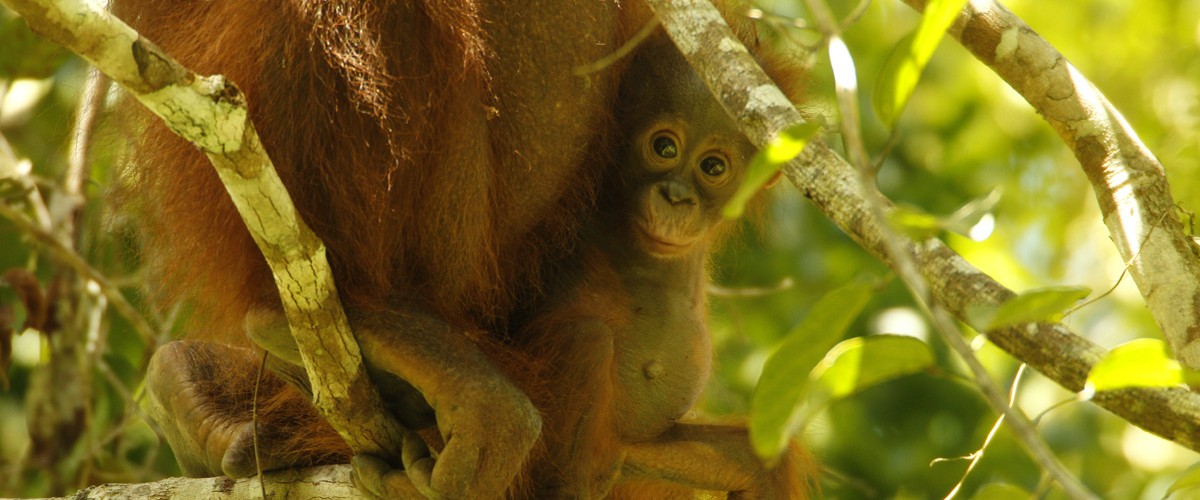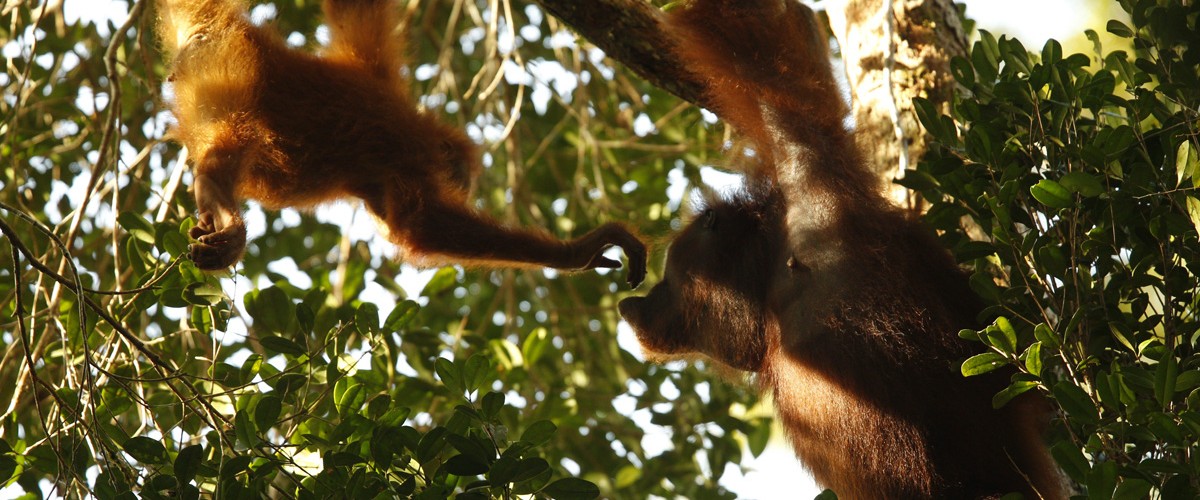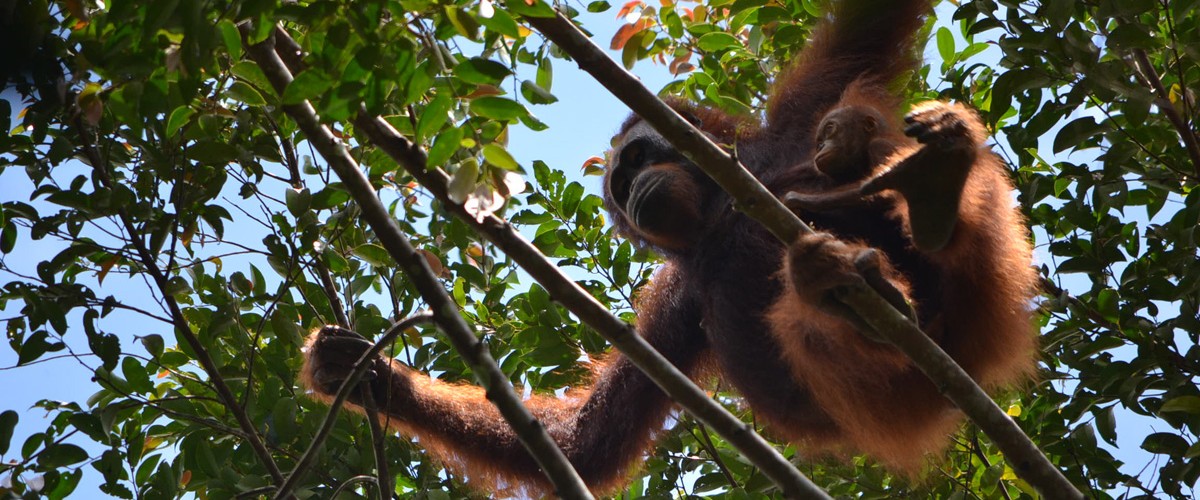By Herman, Orangutan Field Assistant
Hello, my name is Herman. I am a Field Assistant for the Gunung Palung Orangutan Conservation Program/Yayasan Palung. I come from the village of Tanjung Gunung, which is directly adjacent to Gunung Palung National Park, in the Kayong Utara Regency. When I talk about my past work, before I joined the project, I actually feel a little embarrassed. But I think that telling my story can be helpful for others. I worked in the illegal logging world since I was very young, before I got married. I think it was 1996 when I first began working to transport cut wood along a river, out of the forest. At that time, many people made logging their permanent job, including me. When I first started my job was to work transporting cut logs downriver, I was very far from the actual forest area or National Park.

By 1997, there was illegal logging work in the forest of Tanjung Gunung village, where I lived, directly adjacent to the forest entrance of Gunung Palung National Park (GPNP). I then began work as a “wood pusher”, to transport wood from the forest where it was cut to the nearest river, along with some of my friends. I earned a lot of money from logging, because there was a high demand for wood at that time. Then, due to the small size of the location and the high demand for wood, we slowly began to enter GPNP to look for more trees to cut.
By 2004, we worked completely within the GPNP area. When we worked within the National Park boundaries, we were very careful because we knew that there were foreign researchers and forestry officers in and around the Cabang Panti Research Station. I became very uncomfortable working like this because I was afraid of getting caught and going to jail, but there was nowhere else I could work where I would earn as much money as I was getting from logging. In 2007, I switched from working as a wood pusher and became a lumberjack, to actually hold the chainsaw to cut down the trees.
Throughout those years, I must have cut down hundreds of trees in GPNP. I didn’t know whether the trees were protected or not. What mattered to me was that they could be sold. On several occasions I had to run and hide from the GPNP forestry officers. I was almost caught a few times. The working conditions were so tough and I felt so uncomfortable. I always thought about quitting, but I didn’t know what else to do to support my family.
In 2009, I ventured to visit one of the forestry officers in GPNP named Endro Setiawan. I had lots of discussions with Endro and I would ask what kind of solutions there were for me to stop working as a logger. I hadn’t known at first that Endro was a forestry officer who was also a friend/colleague of the foreigners that worked in GPNP. Soon, Endro and the foreigners invited me to help with their work. I began by helping to clear forest transects around the research station. I also worked to help clean the river so that supplies for the camp could be transported up by canoe. After I helped with this work on several different occasions, I had learned a lot from the forest officers and the foreign researchers. I also learned why these foreigners were living inside the forest – so that they could do research on orangutans and their habitat.
Although I continued to work on various projects around Cabang Panti, the work was never permanent, and only as needed. I wasn’t able to stop logging completely, and I even worked as an illegal miner for some time. Around 2014, there was a major operation by forestry officers, police, and the Indonesian national army to enter GPNP and look for illegal loggers. Several people were arrested and taken to the police station. After that, I decided I could no longer work as a logger.

After the majority of the illegal logging activities stopped in the GPNP area, the researchers began entering Cabang Panti by foot, from our village. Previously, people always went up to the camp by boat, entering the river from another area. I really began to love the forest starting in 2018, when I began working as the head porter in Tanjung Gunung. We helped both foreign and Indonesian researchers to bring their belongings from my village to Cabang Panti. This job brought me closer to both forestry officers and researchers at Cabang Panti. I got to know “Ibu” Cheryl Knott, the head of the orangutan project, “Pak” Tim Laman, who works as a wildlife photographer, and “Pak” Andy Marshall, who led the One Forest Project. I continued to learn about the importance of the forest, and learned to care about its protection. I thought, if foreign people come all the way to my home in Indonesia to research forests, orangutans and other wildlife, why would I want to destroy them? During my time as the head porter, I was also asked to help the project during orangutan nest surveys.
Then, at the beginning of 2020, the project offered me a permanent job! I was tasked with working to clear transects, clean the river, search for orangutans, assist with sample collection, and help upkeep the campsite. I was so happy to learn more about orangutan research, and be able to play a direct role in maintaining forest conservation. Now, my friends at Cabang Panti call me “mata elang” (eagle eye) because I was very good at surveying nests, and now am very good at finding orangutans in the forest to follow. I am very grateful to Ibu Cheryl and everyone at Cabang Panti, and the GPNP forestry officers for giving me the opportunity to work my way up to this job.
Now, I look back at my past and know that I could never work in illegal logging again. Really, I stopped and realized I needed to take care of the forest, not just because my job had changed, but because I knew in my heart and learned from all the experiences I’ve had, that I needed to make a change. I encourage you all to take care of the forest! Take care of the future of the earth!
————-
Management of Cabang Panti Research Station is conducted by the Gunung Palung National Park Office (BTN-GP) in collaboration with GPOCP/YP. Scientific research is carried out in conjunction with the Universitas Nasional (UNAS) and Boston University.









